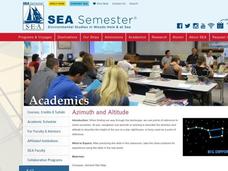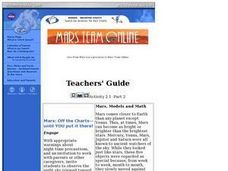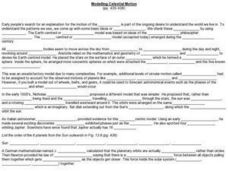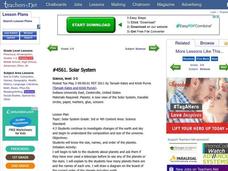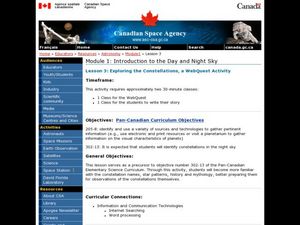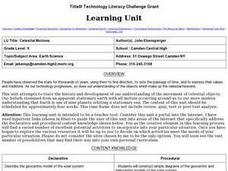Curated OER
Azimuth and Altitude
Students use a compass and their hands to find positions of stars and planets in the night sky or of the sun during the day.
Mrs. Sol's Class
Solar System Project
Finish or launch your unit on the solar system with a jigsaw project covering major celestial concepts such as the Milky Way Galaxy, asteroids, meteors, comets, Earth's moon, and, of course, all the planets. Learners start by writing...
Curated OER
Mars: Off the Charts--Until You Put It There
Learners explore the night sky and make illustrations which are shared in class the next day. Distinctions are made between the stars and the planets and views of the constellations for the season are made available. The work of early...
Curated OER
An Interview with Mr. Sol
Students explore the sun, the galaxy, and planets. As an introduction to a class discussion of the sun, students perform a skit. They discuss the elements that make up the sun, stars and planets.
Curated OER
Solar System (Lesson 2)
Eighth graders identify the objects that make up the solar system. They define new vocabulary and practice using them. They discover that the sun is a star.
Curated OER
Space Trader and Economics
Students use handheld computer with the appropriate software to explore economic skills. They purchase and sell items, travel to planets, and earn enough money to purchase a moon by playing a computer based game.
Curated OER
Modeling Celestial Motion
In this modeling celestial motion instructional activity, students fill in the blank about the motion of celestial bodies: planets and stars. Students complete the blanks with information about the scientists and philosophers responsible...
Curated OER
Stellarium
Students explore the rotation of the planets from various locations on Earth
Using planetarium software, they will make observations, and explain how the rotation of the planets varies based on ones location on the Earth. Students...
Curated OER
Solar System
Students study space. In this solar system lesson, students discover the correct order of the planets and create a diagram showing this knowledge. They listen to the book A New View of the Solar System and then work in groups on their...
Curated OER
Earth
Fourth graders engage in a study of the solar system. The teacher constructs an outside model of it. They walk through it making constructive observations. Students conduct a class discussion about the solar system and planets. They...
Curated OER
WEAVING TECHNOLOGY INTO THEMATIC UNITS
Fourth graders explore the planets by researching and writing a report about one of the nine planets.
Curated OER
Space - In Your Face or Not?
Second graders, in groups, examine how it doesn't matter if they can see the planets in the solar system or not--they're there.
Curated OER
Out of this World! 1
In this space science activity, students use reference books or Internet searches to find the answers to 15 questions about the solar system.
Curated OER
Solar System Bead Distance Activity
Middle schoolers create a scaled solar system model using colorful beads. In this space science instructional activity, students convert AU units into metric measurements. They arrange the planets according to their distances from the sun.
Curated OER
Exploring the Constellations, a WebQuest Activity
Students explore space science by participating in a class WebQuest. In this constellation identification instructional activity, students view star charts based on the four seasons and identify the changes our sky goes through in the...
Curated OER
Celestial Motions
Ninth graders complete a unit of lessons on the history of our knowledge of celestial objects. They conduct Internet research, plot the motion of a planet, construct a model of the sun's apparent motions, and create diagrams of the solar...
Curated OER
Constellations
In this constellations worksheet, learners define and discuss forty key terms associated with constellations and circle each one in a word search puzzle.
Curated OER
Finding the Pole Star
Students study the constellations fo the Big Dipper and Cassiopeia and their use in finding the Pole Star. They realize that other celestial objects--Sun, Moon and planets--share the rotation (and hence rise and set), even though their...
Curated OER
The Planet Earth
Learners explore the planet Earth, outer space, and Earth's axis. They demonstrate reading comprehension skills, including literal meaning, inference and critical analysis.
Curated OER
A DISAPPEARING ACT Astronomy: Do Stars Always Shine?
Students observe why stars are not visible during the day with a classroom demonstration using an index card punched with holes.
Curated OER
Star Wars Activity
Students investigate radiant energy by completing discrepant events and identify various temperature changes through absorption and how radiant energy can be used for solar panels. They experiment with different color fabrics in order...
PBS
Data Plots of Exoplanet Orbital Properties
Scientists discovered the first exoplanet in 1995 and by early 2018, they confirmed the existence of more than 3,700—that's a lot of data! As part of the PBS 9-12 Space series, scholars interpret data about exoplanets. They compare...
NASA
Exploring Exoplanets with Kepler
Calculate the movement and properties of planets like professional astronomers! Scholars use Kepler's third law to find Mercury and Venus's distance from the sun. Using changes in brightness of distant stars and Kepler's third law,...
NASA
The Science of the Sun
There's more to that glowing ball of light in sky than most children realize. From the overall structure of the solar system, to the changing of the seasons, these hands-on lessons open the eyes of young scientists to the important role...
Other popular searches
- Stars and Planets
- Space, Stars and Planets
- The Stars and Planets
- Stars and Planets Worksheets
- Compare Stars and Planets
- Stars and Planets Puzzles
- Space Stars and Planets
- Space\, Stars and Planets
- Comparing Planets and Stars
- Stars Planets
- Space\\, Stars and Planets


